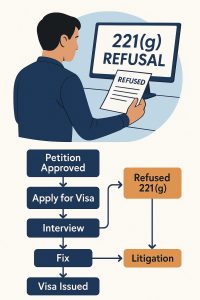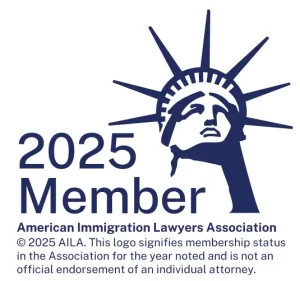At our office, we know how long and emotionally difficult the immigration process can be—particularly when you’re applying for a family-based or employment-based visa after a U.S. petition has already been approved. By the time you attend your interview at a U.S. embassy or consulate abroad, you’ve likely already waited years.
So, it can be alarming to hear the consular officer say your visa is “refused” under INA § 221(g)—or to check your case online and see that dreaded word: “Refused.” Many clients think their case is over. But in most cases, this isn’t a denial at all.
Here’s what’s really going on—and how we can help.
The Bottom Line: 221(g) Is NOT a Denial
A 221(g) refusal is temporary administrative processing—not a final denial.
Under section 221(g) of the Immigration and Nationality Act, a consular officer must either approve or refuse a visa at the time of the interview. When they issue a 221(g), it’s a “soft refusal”—a procedural hold while the consulate waits for more information or completes additional review.
This is routine now. What used to be unusual has become increasingly common. Many of our family-based clients receive 221(g) notices and are approved within days or weeks without any action required from them.
What Happens Next?
If you received specific document requests: You have one year to submit them. We help clients gather and submit these quickly and correctly.
If no documents were requested: Your case is in administrative processing. The State Department aims to complete most cases within 60 days, though some take longer depending on the reason for the delay.
Either way: We monitor your case status and follow up appropriately with the consulate to keep things moving.
How We Help After a 221(g)
When you receive a 221(g) refusal, we step in immediately to:
- Gather any requested documents quickly and correctly
- Track your case status through the CEAC system
- Communicate with the consulate when appropriate
- Provide legal explanations when clarification can resolve issues
In most family-based cases like yours, we’re able to get the visa issued without significant delay—often it’s just a matter of patience while routine background checks complete.
When Cases Take Longer
Some cases remain in administrative processing for months, particularly when security screenings are involved. The reason for delay varies—it’s not “one-size-fits-all.” If your case extends well beyond reasonable timeframes, we’re prepared to discuss additional options, including federal court litigation to compel action.
In Summary
A 221(g) refusal is temporary and usually resolves on its own or with minimal action. As your attorneys, we guide you through this phase and keep your case moving forward.
The key point: Don’t panic when you see “refused.” In most cases, it becomes “approved” with time.
Want to Learn More About 221(g)? Keep Reading…
For those who want comprehensive details about administrative processing, common scenarios, and timing expectations, here’s the complete picture:
Why 221(g) Has Become So Common
Administrative processing has increased significantly in recent years. The consular officer may need additional time to review complex cases, verify employer information, or complete routine security screenings that are now standard for many applicants.
Common Scenarios We See
Document-Related Issues:
- Missing or outdated civil documents (marriage certificates, police clearances)
- Incomplete financial documentation (I-864 affidavit of support issues)
- Clarification needed about employment or relationship details
Administrative Processing Without Document Requests:
- Routine background checks – Standard for most applicants regardless of country
- PIMS system delays – When your approved petition hasn’t been uploaded to the consulate’s database
- Employer verification – Particularly for complex employment situations
- Security screenings – More extensive for applicants from certain countries or with specific travel histories
The Reality About Timing
While the State Department aims for 60-day completion, actual timing varies significantly:
- Simple document issues: Often resolved in days or weeks once submitted
- Routine administrative processing: Typically 4-8 weeks for family cases
- Security-related cases: Can extend several months, particularly for applicants from Middle Eastern countries
- Complex employment verification: Variable timing based on employer responsiveness
What You Can and Cannot Do
You can:
- Submit additional documentation anytime during processing
- Check case status via the CEAC system
- Contact the consulate for status updates (sparingly)
You cannot:
- Speed up the process through contacts or expedite requests
- Get specific timelines – each case is unique
- Avoid the requirement to disclose 221(g) as a “refusal” on future applications
When to Consider Legal Action
If your case remains stalled beyond reasonable timeframes with no explanation, federal court litigation may be an option. This is rare but can be effective when administrative processing extends unreasonably without justification.
Ready for personalised guidance? Contact us to discuss your specific 221(g) situation and develop a strategy to move your case forward.

